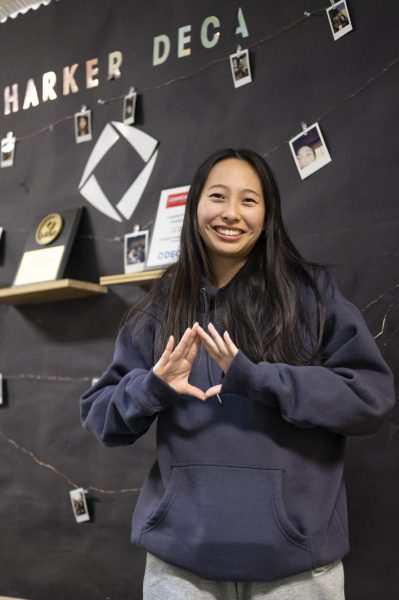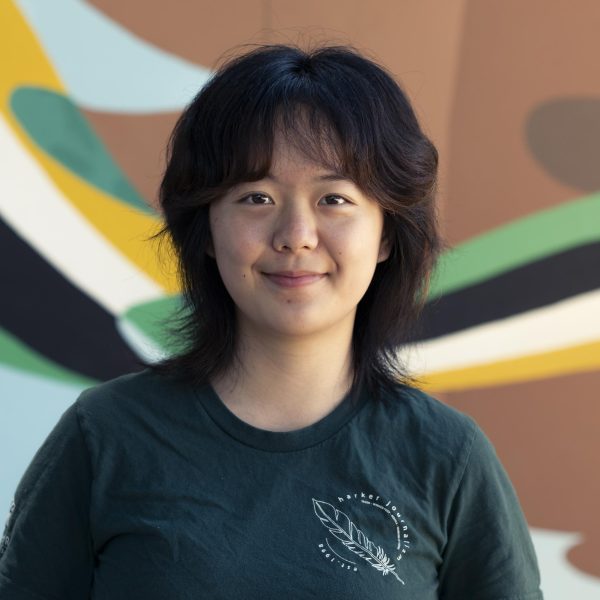
What makes a stage? Wood paneling, stage lights, and red curtains that collide. But a stage does not have to be restricted to its physicality: Metrica Shi (12) would argue that a stage can be the backdrop for something greater. Be it her work in Cantilena or her successes in DECA, she has seen and starred on stage across stages of her life.
Metrica experienced her first year at Harker virtually due to the COVID pandemic, causing her to miss out on a lot of team-building activities new students typically engage in. Metrica’s adviser Bradley Stoll reflects on Metrica’s growth throughout her time in advisory, from being a quieter member of the group to later immersing herself into the larger Harker community through her service in Link Crew.
“She joined Link Crew junior year, which was when she got invested, when she really got involved in the community,” Stoll said. “Her main growth is becoming part of the community and really injecting herself and getting involved in it. It’s helped her mature. Her volunteering, the docent work that she does, has helped her grow also.”
Besides her work in Link Crew and volunteering, Metrica cites her experiences in DECA as another source of growth. Her interest in learning about all things business grew into a community that she dedicates herself to.
“When I first joined [DECA], I felt like I didn’t really know what it was, and the first few meetings totally confused me,” Metrica said. “I was like, ‘Do you know what’s going on?’ It was really confusing. There’s a lot of different parts that come together. But I knew I liked business and I thought I wanted to learn more about it, so I did.”
Of course, a major aspect of DECA are the conferences: the culmination of months’ worth of work for each group. Though the experiences can be stressful, Metrica asserts that competing is a nonetheless enjoyable aspect of the DECA experience as a whole.
“My favorite parts of doing DECA are the conferences, it’s like all the build-up of all your hard work,” Metrica said. “Usually we start on our projects in September, October, and then by December, it’s almost all done. Then you present it and you are really proud of yourself, of all the work that you and your partners have put together, which is a really great time. Winning the conferences is nice, but also to just present is so fun, to share everything you’ve done with a judge.”
DECA teammate Carey Chang (12) speaks on Metrica’s capabilities as a member of their group and her contributions to the project they created in their sophomore year. Having met her through their DECA project the same year, he appreciates the work she put into their project.
“She’s very good at what she does,” Carey said. “I think she brought a lot to our team [in sophomore year]. Without her, we probably wouldn’t have been able to get that far.”
Metrica initially faced setbacks in her sophomore year at the Silicon Valley Conference due to not being prepared enough for the competition. However, her team found motivation from the difficulties she faced to do better, eventually qualifying for the International Career Development Conference (ICDC), leading her to cite that year as the most fruitful of her career.
“I had a really good time my sophomore year,” Metrica said. “We really worked to get our project put together, and it was a lot of work that we put in. When we were presenting, we were super proud of everything we’d done. That year, we even qualified for internationals, and it was so rewarding. It was a realization, ‘Wow, hard work really pays off.’”
Friend and DECA teammate Heidu Lu (12) first met Metrica during the summer before their sophomore year. The same school year, the two became teammates in DECA. Heidi reflects on the traits Metrica possesses that helped them and their project succeed.
“She’s hard-working; she’s really dedicated,” Heidi said. “She thinks outside of the box. Especially when it comes to DECA, her creativity is really important. We were able to get to ICDC because she was able to think outside of the box and come up with unique aspects to our project that made the judges think differently about us from the other contestants.”
With each passing year, Metrica grew not only as a participant but also as a leader within the organization. When she became one of the upperclassmen in the program, Metrica recognized the importance of paying it forward within the DECA community.
“Last year, I became a mentor in DECA, so I got to work with freshmen and help them build their project,” Metrica said. “In my ninth grade, I had a mentor and she helped me a lot to succeed at conferences. It’s a full-circle moment to be able to mentor freshmen myself. I got so excited when one of them went on stage at the Silicon Valley Conference. I was really proud.”


















![“[Building nerf blasters] became this outlet of creativity for me that hasn't been matched by anything else. The process [of] making a build complete to your desire is such a painstakingly difficult process, but I've had to learn from [the skills needed from] soldering to proper painting. There's so many different options for everything, if you think about it, it exists. The best part is [that] if it doesn't exist, you can build it yourself," Ishaan Parate said.](https://harkeraquila.com/wp-content/uploads/2022/08/DSC_8149-900x604.jpg)




![“When I came into high school, I was ready to be a follower. But DECA was a game changer for me. It helped me overcome my fear of public speaking, and it's played such a major role in who I've become today. To be able to successfully lead a chapter of 150 students, an officer team and be one of the upperclassmen I once really admired is something I'm [really] proud of,” Anvitha Tummala ('21) said.](https://harkeraquila.com/wp-content/uploads/2021/07/Screen-Shot-2021-07-25-at-9.50.05-AM-900x594.png)







![“I think getting up in the morning and having a sense of purpose [is exciting]. I think without a certain amount of drive, life is kind of obsolete and mundane, and I think having that every single day is what makes each day unique and kind of makes life exciting,” Neymika Jain (12) said.](https://harkeraquila.com/wp-content/uploads/2017/06/Screen-Shot-2017-06-03-at-4.54.16-PM.png)








![“My slogan is ‘slow feet, don’t eat, and I’m hungry.’ You need to run fast to get where you are–you aren't going to get those championships if you aren't fast,” Angel Cervantes (12) said. “I want to do well in school on my tests and in track and win championships for my team. I live by that, [and] I can do that anywhere: in the classroom or on the field.”](https://harkeraquila.com/wp-content/uploads/2018/06/DSC5146-900x601.jpg)
![“[Volleyball has] taught me how to fall correctly, and another thing it taught is that you don’t have to be the best at something to be good at it. If you just hit the ball in a smart way, then it still scores points and you’re good at it. You could be a background player and still make a much bigger impact on the team than you would think,” Anya Gert (’20) said.](https://harkeraquila.com/wp-content/uploads/2020/06/AnnaGert_JinTuan_HoHPhotoEdited-600x900.jpeg)

![“I'm not nearly there yet, but [my confidence has] definitely been getting better since I was pretty shy and timid coming into Harker my freshman year. I know that there's a lot of people that are really confident in what they do, and I really admire them. Everyone's so driven and that has really pushed me to kind of try to find my own place in high school and be more confident,” Alyssa Huang (’20) said.](https://harkeraquila.com/wp-content/uploads/2020/06/AlyssaHuang_EmilyChen_HoHPhoto-900x749.jpeg)




